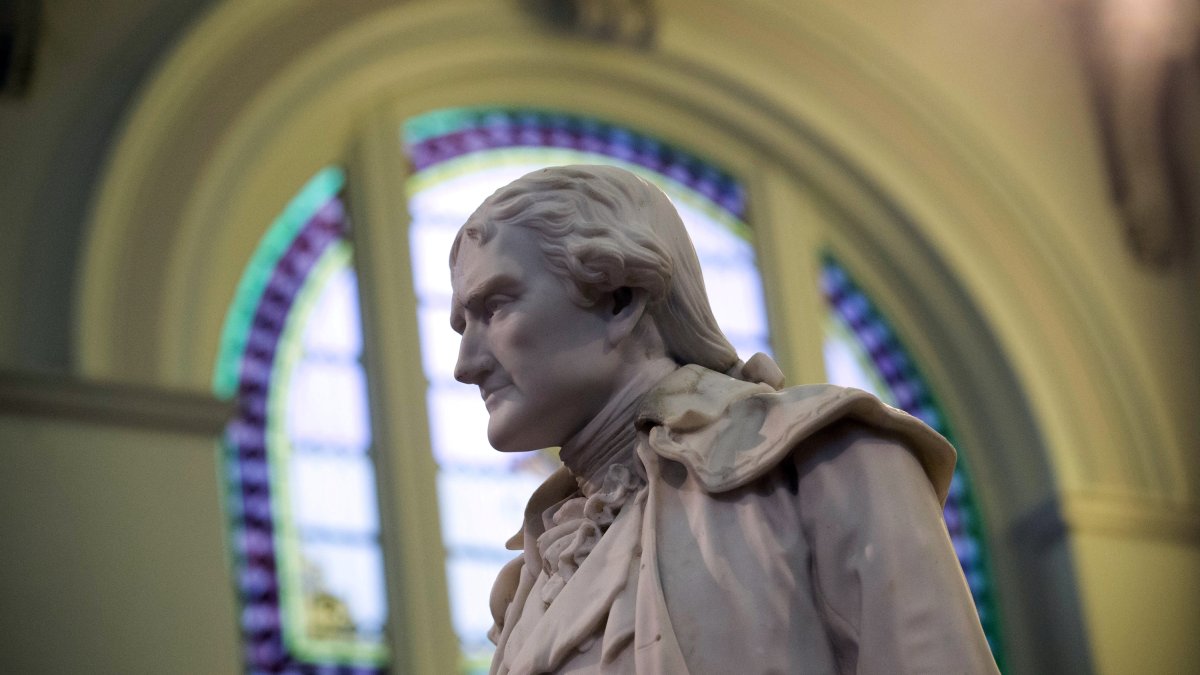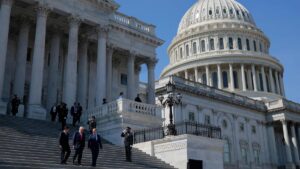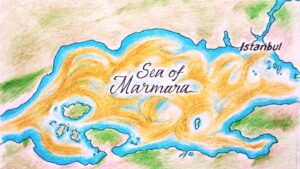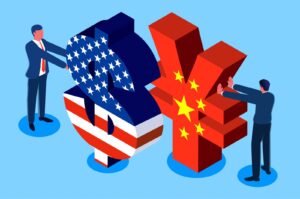It may be useful to consider some of U.S. President Donald Trump’s plans, such as those related to Gaza, in the context of history, as he often references historical events. In this context, it would be appropriate to take a look at the deeds of the third president of the U.S., Thomas Jefferson. Because even in 2015, analyses were published that drew similarities between Trump and Jefferson. Trump himself has made many references to him. Even on Feb. 6, he said that there was nothing better than being gathered in the old House Chamber because Jefferson himself had attended Sunday services there.
Native Americans vs. Palestinians
Jefferson argued that Native Americans should be assimilated and live like whites, or else they should be pushed aside. After a while, it is stated that he believed that assimilation was no longer possible and that the natives should be exterminated. The evolution of Trump’s view on Gazans is similar to this. The so-called “deal of the century” he announced in 2020 would give the Palestinians at least a non-state state and leave Gaza to the Palestinians. Now, he advocates their complete annihilation.
Within the framework of “Manifest Destiny,” which some American conservatives attributed to a divine meaning, the Western settlers were destined to take hold of America. Just as Jefferson used the sanctified doctrine against the Indigenous people, Trump is using the evangelical interpretation against Palestinians. Trump’s proposal is clearly against both the cease-fire agreement and the 4th Geneva Convention of 1949, to which the U.S. and Israel are parties. However, it is also possible to say that he is under the illusion that he will do a divine act above the law.
Jefferson’s arguably most famous deed was the purchase of Louisiana, which more than doubled American territory. It can be said that Trump, imitating his predecessor whom he admires, put forward the “purchase” argument and aims to achieve the same “great success” by the same means.
Despite the 1.5 years of genocide, Israel was unable to destroy Hamas’s military power. Moreover, it led to a partial increase in international support for Palestinians. Despite all the difficulties, Hamas continues its struggle against Israeli expansionism. Two centuries ago, the Native American Creek tribes also struggled against American expansionism despite all the problems. But the seventh president of the U.S., whom Trump admires, Andrew Jackson, defeated them at the Battle of Horseshoe Bend in 1814 and ended the Creek War. When he became president with the power he gained, Jackson initiated an ethnic cleansing of Native Americans. More than 60,000 of them were forcibly displaced, known today as the Trail of Tears. Trump’s desire to ensure expansion in Gaza, if necessary by war, and to forcibly displace the natives of Gaza, is clearly similar to Jackson’s sins.
Native Americans struggled to resist oppression despite their internal divisions and enmities. However, some took the side of the Americans. Today, there is division in the Arab and Muslim world as well, and there are even those who have taken sides with Israel and the U.S. Trump and the Zionists who defend this plan blame the economic hardship in Gaza entirely on Hamas. By doing so, they are taking one of the most shameless stances in history.
It’s known where the story went for Native Americans. Trump and his masters hope for a similar outcome for Gaza and its surroundings. However, there are differences between these two cases as well.
Forcing nations to unite
When French general Napoleon Bonaparte made his Egyptian-Syrian campaign, he promised the Jews the land of Palestine. This is not a well-known fact in history because it failed. (I would like to note that Jewish writers remember this and remind us. When the Gaza project was announced, an article in the Times of Israel evaluated Trump’s words in terms of Napoleon’s promise.) In fact, this is regarded as one of the moments in history when they came closest to capturing Palestine. However, Napoleon was defeated by Cezzar Ahmed Pasha, the French advance turned into a retreat, and his plans for Palestine failed.
The Balfour Declaration, on the other hand, did not fail. The Jews managed to get their “homeland” and started the State of Israel, thanks to the declaration. Therefore, Israel keeps glorifying and commemorating it, making the declaration very famous. If Trump’s offer is put into practice, it can be called the “second Balfour Declaration.” Otherwise, it will suffer the same fate as Napoleon’s.
It can even be worse. Namely, Napoleon’s promise not being kept left the Jews in their old position. However, Trump’s actions could cause more European countries to recognize the State of Palestine and Israel to lose more support. He dreams of disciplining the Europeans to get what he wants, just like Jefferson took Louisiana from Napoleon and Jackson defeated the British in New Orleans. However, defeating separate powers is one thing, and confronting them all is another.
Trump’s steps could end the division among European countries and/or Muslim countries. Although this is unlikely, his excessive humiliation, oppression and exploitation, and his disregard for international diplomacy and laws, could lead them to reconsider their attitude of overlooking Israeli atrocities.
Who will implement the plan?
Trump’s plan has gained support from the Israeli far right. However, if the desired outcome does not materialize, alternative Israeli leaders, such as former Israeli Prime Minister Naftali Bennett, who is ahead in recent polls, may come to the forefront. Or politicians such as Moshe Feiglin, who was one of Israeli Prime Minister Benjamin Netanyahu’s main rivals in the Likud leadership race in the past, may rise. Feiglin said in 2014 that the solution for Gaza was to remove all Gazans from there and resettle them somewhere else. In 2019, he openly advocated annexation.
Trump’s former adviser, evangelical writer Mike Evans, wrote an article in 2021, expressing how he was humiliated by Netanyahu’s father despite his services (despite the humiliation, he continued to serve them). In that article, he wrote against Naftali Bennett, arguing that Netanyahu was the leader “chosen by God.” If Trump shares this view, he will also work with Netanyahu to design Israeli domestic politics. Some Israelis have been uncomfortable with the possibility of an outsider’s shaping the course of events, thereby opposing Trump’s plan.
U.N. Trade and Development (UNCTAD) wrote in 2019 that “Oil and natural gas resources in the occupied Palestinian territory could generate hundreds of billions of dollars for development,” drawing attention to Gaza. Trump may be trying to gain such an advantage for his future plans, such as his planned trade war with China.




















































Be First to Comment